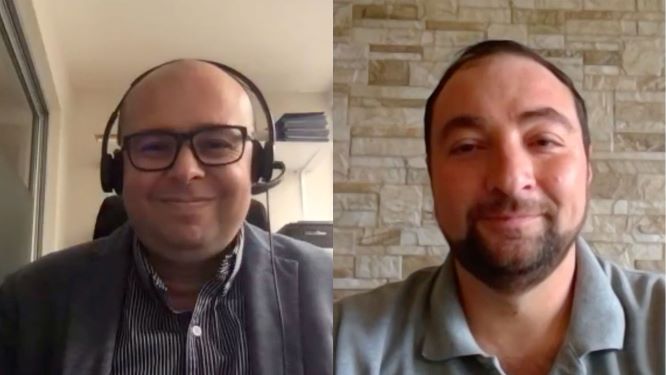 CLOUD
CLOUD
 CLOUD
CLOUD
 CLOUD
CLOUD
The COVID-19 pandemic showed that technology can be a powerful tool in education – online systems allowed students to migrate to homeschooling in a matter of weeks as governments tried to contain the spread of the virus. But much more can be done.
With high dropout rates, Costa Rica engaged with startup EduTech de Centro America to design, develop and implement a Student Registration and Early Warning System, which allows for the transmission of data alerts that help the education system react to risks that can affect students’ achievements.
“In the first quarter [of 2020], 90,000 students were not in our schools because we went from face-to-face service to a virtual service so we could react very quickly,” said Rafael Ramirez Pacheco (pictured, right), product manager at the Costa Rica Ministry of Education. “The idea was to locate where students were and in the next four months we could reduce the dropout from 90,000 students to 18,000 … students. After that, we initiated another stage to retrieve those 18,000 students back to school.”
The project won the “Best Startup Delivering Innovation” award in 2021 from Amazon Web Services Inc.
Pacheco and Josue Montero (pictured, left), founder and president of EduTech de Centro America, spoke with Natalie Erlich, host of theCUBE, SiliconANGLE Media’s livestreaming studio, during the 2021 AWS Global Public Sector Partner Awards. They discussed the problems facing Costa Rica’s education system, the extensive technology program developed by EduTech, and the goals the program intends to achieve. (* Disclosure below.)
A major difficulty faced by Costa Rica in dealing with the high dropout rate was that the local education system relied on paper-based data collection.
“We would gather the collect data in paper and take that to the central office, and this would enter into an excel file,” Pacheco explained. “This [would] take around two months to process all this data and make decisions.”
Thus, the first thing done with EduTech was to digitally record the number of students — it was possible to obtain enrollment data for 1,163,982 students, involving the entire educational population, both public and private. All data was stored in the AWS cloud.
With a file for each student, the government can track abstentions, as well as everything that the student does in the different academic years, and, in this way, design more suitable curricula.
“We can identify the lacks, the weaknesses, and we can see which are the programs that are more appropriate so as to replicate this in the rest of the country,” Pacheco stated.
One of the most important aspects of the program is that it involves students from all levels of education: kindergarten, preschool, primary school, secondary school, higher education and technical education. “We’ve reached every single sector where the Ministry of Education was able to detect where there was a need in the country,” he added.
The program developed by EduTech for the Ministry of Education of Costa Rica has eight stages and promises to bring on board different types of technology. One tool that will likely be adopted is AWS Rekognition, to solve the problem of undocumented students.
As many students in the country do not have any type of identification, it is extremely difficult for the education system to monitor their presence and performance. The idea is to use the technology to recognize their faces or fingerprints, giving them an identification, according to Montero.
“It’s amazing technology that allows the Ministry of Education and the students to have a voice, to have a presence even though they don’t have their actual documentation because of whatever reason,” Montero said. “It can change people’s life, and it can change students’ lives.”
Connectivity and cloud-based services also tend to spread to other Costa Rican government agencies, and some ministries have already incorporated some tools for managing COVID-19. The Ministry of Health, for example, has a set of apps to identify who tests positive for the virus, and this has allowed the Ministry of Education to associate the situation with students in the classroom, according to Pacheco.
“AWS has a set of services that allow us to focus on the problem instead of the solution or the technology, because the services are already available,” he concluded.
Watch the complete video interview below, and be sure to check out more of SiliconANGLE’s and theCUBE’s coverage of the 2021 AWS Global Public Sector Partner Awards. (* Disclosure: TheCUBE is a paid media partner for 2021 Global Public Sector Partner Awards. Neither Amazon Web Services Inc., the sponsor for theCUBE’s event coverage, nor other sponsors have editorial control over content on theCUBE or SiliconANGLE.)
Support our mission to keep content open and free by engaging with theCUBE community. Join theCUBE’s Alumni Trust Network, where technology leaders connect, share intelligence and create opportunities.
Founded by tech visionaries John Furrier and Dave Vellante, SiliconANGLE Media has built a dynamic ecosystem of industry-leading digital media brands that reach 15+ million elite tech professionals. Our new proprietary theCUBE AI Video Cloud is breaking ground in audience interaction, leveraging theCUBEai.com neural network to help technology companies make data-driven decisions and stay at the forefront of industry conversations.